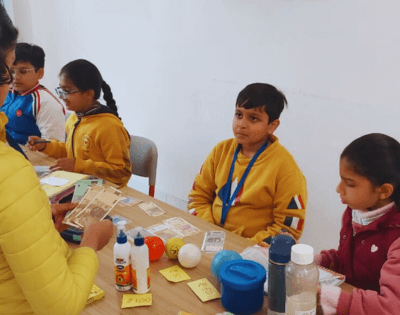There is a fine line between standing by your child like a strong pillar & dictating every move they make.
While parents’ first instinct is to protect their children and help them navigate life smoothly, the study suggests that excessive intervention by parents can hinder their children’s growth. Parents always have the best interests of their kids at heart, but too much involvement can limit their child’s capacity to learn from mistakes.
The solution is not to step back completely but to master a balance. The best CBSE schools in Gurgaon encourage parents to support without suffocating and guide without controlling. Let the child’s confidence in their abilities blossom as they navigate challenges independently. This fosters independent thinkers & capable individuals who are ready to face the world on their terms.
Let’s explore what micromanaging in parenting looks like, its unintended effects on children, & how you can stay positively involved without becoming overly directive.

The Micromanaging Paradigm – How parents micromanage kids
Micromanaging parenting stems from a parent’s love and deep concern for their child. Will they enjoy it at school? Could they complete the project independently? What if they are not studying enough? No matter how pure the intentions behind these worries are, their impact on the child can be quite the opposite.
A Parental Self-Evaluation
Here are some common signs of a micromanaging parent that will help you reflect on your parenting style.
- Constantly checking up on your child’s tasks & progress
- Over-scheduling every part of their day
- Making decisions for them instead of with them
- Not allowing them to make and learn from mistakes
- Frequently criticising even on minor matters

How does micromanaging affect children?
Micromanaging your child’s life can do more harm than good. Let’s have a close look at the impact of a micromanaging parent on children.
-
- Anxiety and insecurity
When the parent keeps a close watch on every action of their child and jumps in to correct their mistakes, it makes them feel that they are not good enough.
-
- Struggle with decision-making
Children who are accustomed to their parents making every decision for them—what to wear, eat, study, or pursue—often struggle when it’s time to make choices for themselves.
-
- Lack of responsibility
Ironically, the more we try to take over, the less our children learn to take charge. If every mistake is preempted or fixed, there’s no incentive or opportunity to take responsibility for their actions.
- Dependency on external validation
Children who have always been micromanaged look for a green light signal as they struggle to rely on their judgment.

How To Avoid Micromanaging & Get Involved Healthily?
Striking the right balance between being involved and over-involved can be challenging. It requires parents to be strategic with their approach. Here are some ways you can stay engaged in your child’s life without slipping into micromanagement.
- Collaborate, don’t dictate.
Controlled parenting stems from a belief that I know what’s best for my child. Being an adult, you might have more experience, but a child thrives when they feel involved rather than instructed. Instead of teaching your child to study maths from 5 pm to 6 pm, ask them what time works best for them. Open-ended communication makes the child feel heard, and they will be more likely to follow that routine.
- Set perfection aside, enjoy progress.
Perfectionism is one of the root causes of micromanaging. The learning curve of children involves taking action, making mistakes, and learning from them. Let go of the expectations of having flawless outcomes from children and celebrate their small wins. Next time they fold their laundry with excitement, no matter how messy the pile looks, resist the urge to redo it. Just appreciate them for their efforts. Choosing progress over perfection develops a growth mindset and builds the child’s confidence.
- Set realistic expectations
Every child grows and develops skills at their own pace. Mistakes play an important role in the learning journey. Don’t set your expectations too high or be rigid with the outcome. This might create a performance pressure, hindering their growth. Allow them the space to make mistakes, learn from them and figure out things themselves. Children who are allowed to falter occasionally develop resilience, accountability, and better problem-solving skills.

- Respect individuality
Micromanaging parents desire to see their child fulfil dreams and goals that they have set. Your child doesn’t have to be a reflection of you; they can be unique in their preferences. They might like to spend their time drawing, while you find solving math problems more fun. Instead of forcing them to follow your vision, let them build on their natural strengths. When children feel more accepted for who they are, they thrive more beautifully.
- Get involved strategically
Micromanaging mothers tend to overindulge in their child’s life. Take a step back, think of yourself like a coach who guides children standing at the side and lets them own the ground. Attend your child’s parents’ teacher meeting to understand the trajectory of your child’s development. This way, you can be a part of your child’s learning journey without overshadowing it.
Final Thoughts: Step Back to Lift Them Higher
Being an involved parent doesn’t mean knowing every detail of every assignment or managing every decision. It means creating the space for your child to grow – being their cheerleader, not their taskmaster.
At the Blue Bells School, one of the best CBSE schools in Gurgaon, we believe in nurturing independent thinkers. Through collaborative teaching & a space that values student voice, we help learners flourish without fear. We welcome parents to join us in this journey—not as micromanagers, but as mentors, cheerleaders, & guides.




